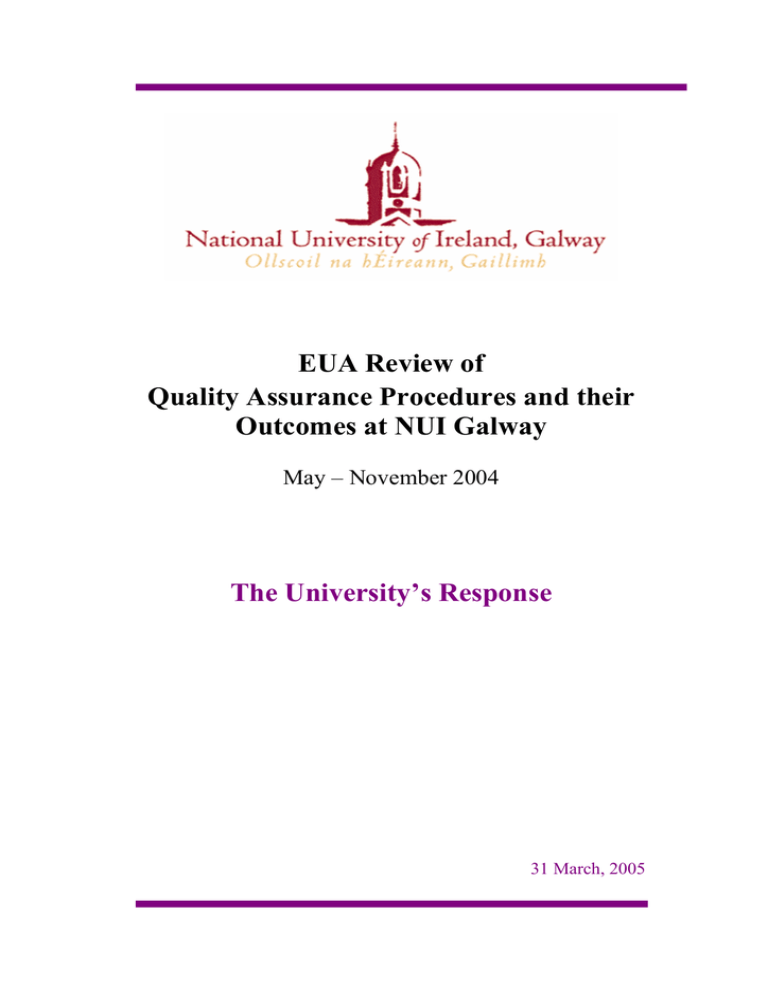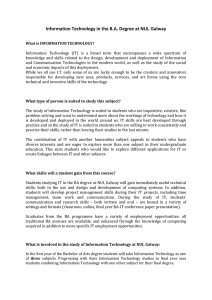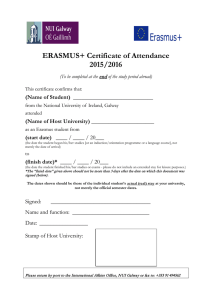EUA Review of Quality Assurance Procedures and their Outcomes at NUI Galway
advertisement

EUA Review of Quality Assurance Procedures and their Outcomes at NUI Galway May – November 2004 The University’s Response 31 March, 2005 NUI Galway Response to Report: 2004 EUA Review of Quality Procedures & Outcomes NuigResponseEuaRevi04-9 Available on Quality Office Website 2 09/10/2007 NUI Galway Response to Report: 2004 EUA Review of Quality Procedures & Outcomes 3 Preliminary This document is a response to the EUA Report: ‘Quality Review of the National University of Ireland, Galway’, which was prepared following visits in May and November 2004 totaling five days. A comprehensive action plan for the University is also in preparation and this will take into account also recommendations in the EUA Sectoral Report ‘Review of Quality Assurance in Irish Universities’, which was carried out in parallel. Benefits NUI Galway has benefited from this review exercise both during the Self Evaluation phase and the Review phase, and wishes to thank sincerely the IUQB, the HEA and of course the EUA reviewers for initiating and implementing it. As regularly occurs with review reports, while the benefits of this review to NUI Galway are significant, many issues identified in the EUA Report were cited in the University’s Self Evaluation Report. Some are even identified as requiring specified and timetabled actions in the University’s Strategic and Academic plans, published in 2003, and covering the period 2003–2008. However, a number of very important matters are now much more clearly delineated and have been promoted in the University’s table of priorities. The Self Evaluation phase provided an opportunity for a detailed examination of the University’s position, relevant constraints, potential and issues that needed to be addressed. The Review visit provided a forum for the expression of the views of all sectors of the University, and the Review Report contains a series of 12 insightful recommendations that will help the University focus on identifying new relevant actions. Responses to the 12 Recommendations 1. That NUI Galway develop advocacy strategies for the support of tertiary education in Ireland as well as every possible means to assure the implementation of the HEA’s plan, dated 8 September 2004, the Review and Prioritisation of Capital Projects in the Higher Education Sector. The University has undertaken a sustained lobbying campaign in support of the implementation of this HEA Report by the Government. This has included meetings with the Taoiseach, the Tánaiste, successive Ministers for Education, senior staff in the Department of Education and at the HEA. Presentations have been made to all local Government Ministers and to the local Dáil TDs of the Government parties; to the Galway Chamber of Commerce, the Institute of Engineers of Ireland, Enterprise Ireland, the IDA, and IBEC. This campaign continues. The separate reference in the EUA Report to the need “to act to repair its aging campus buildings” is related directly to the need for restoration of the HEA’s ‘capital maintenance programme’, and is very welcome. The cutback on this item a few years ago has had serious detrimental effects on the ability of the University to maintain its physical infrastructure. The University, individually and through CHIU, is also lobbying the Government on this issue. NuigResponseEuaRevi04-9 Available on Quality Office Website 09/10/2007 NUI Galway Response to Report: 2004 EUA Review of Quality Procedures & Outcomes 4 2. The review of the internal organisational structure must continue melding smaller units into larger ones. The University notes that this issue was discussed in the 2004 Report arising from the OECD Review of Higher Education in Ireland, which also included a comparable recommendation. NUI Galway is fully committed to the review of its structures for the delivery of academic programmes and the organization of research; this is explicit in its Strategic Plan and, with support from the academic review process, three smaller science departments have already been amalgamated to become the Department of Earth and Ocean Sciences. Given the large number of smaller academic units, the advantages of amalgamations are significant. Among others, they facilitate/promote: Improved resources for internal administration Opportunities for new initiatives More effective quality reviews An Academic Council working group on departmental management and academic leadership is examining the internal administrative requirements for effective academic activities, and it is anticipated that its recommendations (due by September 2005) will provide a cogent rationale and incentives to staff to participate in amalgamations. New professorial appointments have been and are being made with the proviso that certain amalgamations are planned. Working groups, projects and discussions are underway with respect to the following academic units: The biological departments, Botany and Zoology. The departments of the Faculty of Commerce The departments of the Faculty of Engineering Three scientific departments with major inputs to medical education, namely Anatomy, Clinical Pharmacology and Physiology The four Modern Language departments, French, German, Italian and Spanish (These departments are collectively participating in the on-going IUQB sectoral project ‘Strategic Planning in Academic Department.) Finally, while the University agrees fully with the need to develop larger academic units, these changes in structure will follow and support its overall strategic objectives. Such changes will also exploit opportunities offered by up-coming physical developments to achieve full participation by staff and maximum benefits. 3. The review of the size, role and structure of the Governing Authority as well as the Academic Council must continue in spite of their regulation in the Universities Act of 1997 which have to be questioned. The University notes that similar issues were discussed in the 2004 Report arising from the OECD Review of Higher Education in Ireland, which also included comparable recommendations. The University is subject to legislation on this and will contribute to the debate on any changes proposed. Internally, structures are under continuous review. In particular, the Údarás has asked its Standing and Strategic Planning Committee to prepare advise it on the advantages and disadvantages of appointing an NuigResponseEuaRevi04-9 Available on Quality Office Website 09/10/2007 NUI Galway Response to Report: 2004 EUA Review of Quality Procedures & Outcomes 5 independent Chair, as it is empowered to do under the Universities Act 1997. Furthermore as part of the Strategic Plan (Strategic Priority 6), the University management team (UMT) is committed to reviewing institutional organisational structures with a view to developing clearer and more efficient alternatives. 4. It is recommended that a formal Council of Deans be established, with a clear statement of roles and authority for both the Council and the individual deans. Also on page 12 of the EUA Review Report: The deans’ positions, roles, duties and responsibilities should be recognized in the organisation of NUI Galway and the deans as a group should be more systematically involved in the decision process. The University notes and welcomes this recommendation and UMT will consider what processes may best be used to help ‘define and formalize the positions, roles, duties and responsibilities within the University. The Academic Planning and Implementation Group, which consists of the Deans and the Directors of major academic services (Librarian, Príomhfheidhmeannach an Acadaimh, Director of Computer Services, Director of the Centre for Excellence in Learning and Teaching (CELT), Director of Quality, Head of Adult Education, VP for Research etc.) has met twice yearly for the last three years. UMT and the Údarás will be presented with a proposal that this Group be formally constituted with defined terms of reference before the end of 2005. As these terms are drafted, the respective roles of Academic Council, the Standing Committee of Academic Council, Academic Planning and Resource Committee (APRC) and of the new Group will be reviewed together with a view to developing clarity on their respective roles in policy formulation and decision making on academic matters. 5. In terms of the institutional resource allocation system, its rationale, its priorities, and its criteria, there is a great need for more transparency for faculties and departments. The University recognizes the need for greater transparency in its processes and will review how this can be effected in line with existing structures and proposed organizational changes. 6. In terms of internationalisation, it is recommended that the University broaden its concept from just recruiting overseas students to developing international and European understandings and opportunities. The International Office has been reorganised to widen the scope of the University’s involvement internationally. The present concept is in any case much wider than recruitment, with membership of the Coimbra Group of European universities, formal links through memoranda of agreement and understanding with many institutions, and many formal research agreements across the world. NuigResponseEuaRevi04-9 Available on Quality Office Website 09/10/2007 NUI Galway Response to Report: 2004 EUA Review of Quality Procedures & Outcomes 6 Just this month NUI Galway announced a new scholarship fund to support students from developing countries and is actively raising money through the University Foundation for this purpose. In addition, high quality research students from non EU countries are given fee concessions. The University’s community Knowledge Initiative to promote and support service learning also has a growing international dimension. Other actions to enhance the international experience of NUI Galway students, international activities in general and awareness of them will be considered for inclusion in the University’s action plans, consequent on the EUA Reports. 7. In order to serve a growing student body, it is also recommended NUI Galway establish an institutional research office with thorough planning for role and function, so that the right data are collected and analyzed. While this is already an explicit objective of the University, this recommendation is welcomed because it may make giving a higher priority to the allocation of sufficient resources easier. Establishing an institutional research function is already Part of Strategic Priority 1 of the Strategic Plan 2003–08, which reads: “Establish an internal research function to generate and monitor performance indicators for all aspects of the University”. Also a workshop for deans and senior managers with Dr Mark Putnam, Director of Institutional Research at North Eastern University Boston was held last year. Actions to be implemented by September 2005 include: Reappointment of the Director of Quality with an extended job description to include responsibility for institutional research. Commissioning an ‘Information Audit of the University’ Appointment of a qualified information analyst to the Quality office Participation in the IUQB sectoral project on institutional research. An executive information system has been implemented by the University’s Management Information Services and will have a fundamental role in these developments. 8. The Review Team strongly recommends that NUI Galway address the contradiction between its aspiration of being a student-centred university and the students’ complaints about large classes, too little space, too few computers and too few student services. All of these issues are being addressed with urgency as part of the University’s Strategic Plan. Taking the issues mentioned one at a time: The University does not see large classes per se as an issue (the largest here are smaller than elsewhere in Ireland and, with proper supports and skilled lecturers, even very large classes can be effective); rather improvements need to be made in how large classes are given, supported and supplemented. o As a pilot, one of the largest theatres has been equipped with all the best modern electronic teaching supports and selected staff are being trained by CELT and gaining experience in using these to ensure greater student participation and active learning. NuigResponseEuaRevi04-9 Available on Quality Office Website 09/10/2007 NUI Galway Response to Report: 2004 EUA Review of Quality Procedures & Outcomes 7 o Courses on teaching large classes are offered regularly at CELT. o The Department of English will begin in September 2005 offering first year English for BA students through a mixture of conventional lectures, self directed learning and a redesigned tutorial system. With respect to too little space, major new facilities are under construction, (Business School, The Nursing, Therapies, Sociology and Politics Building) and others are funded and/or are at an advanced in planning (Engineering, Human Biology, Psychology, Library extension etc.) With respect to too few computers, the new buildings above will have new extensive computer suites. Wireless linkages to the campus network in certain locations have been in operation, are being used regularly by many students, and new locations are planned. With respect to too few student services, in spring 2003 a new vice president post was created with overall responsibility for Student Services, Student Services have been reviewed in 2004–05, some re-structuring has already taken place, and a strategic plan for all these services is being finalised. 9. [I]t is recommended that systematic evaluations of all courses be introduced immediately. However, these evaluations must be kept confidential and not made public. The deans and department heads should assume the responsibility for the follow-up of course evaluations. Students should be informed of actions taken as a result of the evaluations, e.g. inform the new course group of comments from the former students and tell them about department actions taken as a result of the former evaluation. The Criteria for Academic Departments and Programmes adopted by Academic Council in June 2003 specify such mechanisms. These Criteria specify explicitly that: ‘Mechanisms are in place to facilitate the expression of students’ views and to provide feedback.” Also, in the Guidelines for reviews of academic departments and programmes, the provision of a series of standard documents is seen an inherent part of the academic review process. Although there are no explicit consequences for non-compliance, documents that must be specified include: Minutes of meetings of staff-student committees with actions proposed and the effects of previous improvements over the last year. Summary reports of student surveys for each programme with actions proposed and the effects of previous improvements over the last full academic year. In addition, about 150 members of teaching staff have participated at least once in the voluntary Grouped Student Teaching Evaluation Scheme initiated by the Quality Office and now run by the new Centre for Excellence in Learning and Teaching (CELT). This represent about 20% of all academic staff. Evaluation of teaching performance is a feature of promotion to senior lecturer and this will be made more explicit over the coming year with the professional support of CELT. All teaching staff (and in particular all new appointees) will be encouraged strongly to avail of the new post graduate programme in teaching and learning NuigResponseEuaRevi04-9 Available on Quality Office Website 09/10/2007 NUI Galway Response to Report: 2004 EUA Review of Quality Procedures & Outcomes 8 organised by CELT. This promotes strongly reflective practice and is already heavily subscribed. Finally, within this academic year 2004–05, a motion will be put to Academic Council proposing an explicit policy that all faculties develop and adopt a regulation that all heads of academic departments and coordinators of academic programmes must institute regular, balanced and coordinated mechanisms for the collection, analysis and appropriate implementation of feedback from all students. 10. The Review Team strongly recommends that the Guidelines for the Quality Assurance procedures should emphasize that recommendations presented by the Quality Audit should be sensitive to resource constraints. As they are revised during the summer of each and every year, this coming summer the Guidelines for the Quality Assurance will be changed to implement fully this recommendation. 11. To avoid “review fatigue” and reduce the review burden, it is recommended that when possible the University combine Quality Audits with accreditation processes. This a logical and reasonable recommendation and concerns a practice that has been in place for some time. In 1999–2000, in close cooperation with the Institute of Engineers of Ireland (IEI), the review visit for Review of the Department of Civil Engineering, overlapped by two days the IEI Accreditation visit for the BE in Civil Engineering and also involved all the IEI reviewers. The self evaluations reports for the two processes contained many common sections and there were common or similar sections in the two review reports prepared, one for the IEI and one for the University review process. This or a similar option is open to all departments subject to accreditation reviews and it may be adopted by the new Departments of Occupational Therapy and Speech Therapy. However, in recent years most departments with upcoming accreditation and quality reviews opt to undergo them separately, in spite of the extra work involved. Their reasons vary and include: Since many of the relevant departments now run more than one academic programme that is subject to accreditation processes, the advantages of combined the processes are less than formerly. Undergoing a quality review is a good preparation for an important upcoming accreditation process (this was the attitude of the Department prior to the review of the Department of Information Technology in 2000–01) With respect to professional programmes, accreditation and quality review serve somewhat different purposes. The former primarily assures the quality of the product i.e. the competence of the graduates, whilst the latter is intended to assure the quality of the process i.e. the overall effectiveness of a department in its broad context. Separate evaluation can therefore make sense as thereby muddling of the issues is avoided. (this was the approach taken by the Department with respect to the review of the Department of Mechanical and Biomedical Engineering in 2004–05) NuigResponseEuaRevi04-9 Available on Quality Office Website 09/10/2007 NUI Galway Response to Report: 2004 EUA Review of Quality Procedures & Outcomes 9 12. And finally, it is recommended to extend the time schedules of quality audits to 7 years with the provision that a shorter term might be required in some instances. Because a regular cycle length of seven years is too long if the review system at NUI Galway is to contribute to the continuous and widespread reform at all levels that is urgently needed, is not proposed that NUI Galway implement this recommendation as it stands. However, since this recommendation was not lightly made, consideration will be given to widening the grounds upon which units may apply to have a scheduled review deferred by one year. NuigResponseEuaRevi04-9 Available on Quality Office Website 09/10/2007


